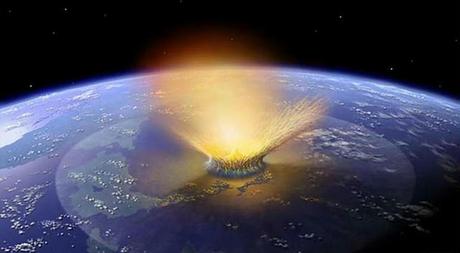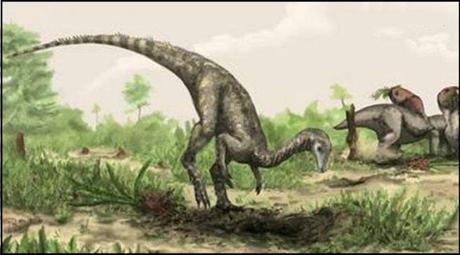And does the phrase actually mean the World or the human perception of our planet? I can’t think of any one single war, political upheaval or natural disaster that has shook the whole of the world for us. Presuming that Noah’s Ark was a myth in Mesopotamian times.
But I can think of a single event that did shake the world and change it forever. This is how the Natural History Museum describes it: "Sixty-six million years ago, dinosaurs had the ultimate bad day. With a devastating asteroid impact, a reign that had lasted 180 million years was abruptly ended."
In 1980, Nobel Prize-winning physicist Luis Walter Alvarez and his geologist son Walter published a theory that a historic layer of iridium-rich clay was caused by a large asteroid colliding with Earth. The instantaneous devastation in the immediate vicinity and the widespread secondary effects of an asteroid impact were considered to be why the dinosaurs died out so suddenly.An asteroid impact is supported by really good evidence because we've identified the crater. It's now largely buried on the seafloor off the coast of Mexico. It is exactly the same age as the extinction of the non-bird dinosaurs, which can be tracked in the rock record all around the world.The impact site, known as the Chicxulub crater, is centred on the Yucatรกn Peninsula in Mexico. The asteroid is thought to have been between 10 and 15 kilometres wide, but the velocity of its collision caused the creation of a much larger crater, 150 kilometres in diameter - the second-largest crater on the planet. The date of the dinosaur extinction is 66.0 million years ago.But what caused global mass extinctions? Around 75% of Earth's animals, including dinosaurs, suddenly died out at the same point in time. So how was it all caused by a rock hurtling into the coast of Central America? The asteroid hit at high velocity and effectively vaporised. It made a huge crater, so in the immediate area there was total devastation. A huge blast wave and heatwave went out and it threw vast amounts of material up into the atmosphere. It sent soot traveling all around the world. It didn't completely block out the Sun, but it reduced the amount of light that reached the Earth's surface. So it had an impact on plant growth.
 Like dominos, this trailed up the food chain, causing the ecosystem to collapse. There is a lot of discussion over the actual kill mechanism and how long that period lasted. There are still a lot of unknowns. But it was a massive event affecting all life on Earth, from microorganisms all the way through to dinosaurs. The casualty list is long. Among them, ammonites, some microscopic plankton, and large marine reptiles all died out.But the loss made room for the beginnings of the modern world.I did have to trim that article a bit but I hope the main thrust of it makes sense.As for another day that changed the world. I wrote the following for the birth of my friend’s grandson, Blake:
Like dominos, this trailed up the food chain, causing the ecosystem to collapse. There is a lot of discussion over the actual kill mechanism and how long that period lasted. There are still a lot of unknowns. But it was a massive event affecting all life on Earth, from microorganisms all the way through to dinosaurs. The casualty list is long. Among them, ammonites, some microscopic plankton, and large marine reptiles all died out.But the loss made room for the beginnings of the modern world.I did have to trim that article a bit but I hope the main thrust of it makes sense.As for another day that changed the world. I wrote the following for the birth of my friend’s grandson, Blake:Friday 19th January 2018(for Blake Ricci)Sunrise in London was 7-56it was not rainingThe London Model Engineering Exhibitionopened in The Alexandra Palace at 10 ammars bars were 60pthe sun shone at middaybut it was cloudy in FirenzePaddington Bear 2 is the best film everthe top selling single was RiverSunset in London was 4-26Jupiter was visibleDerby County and Bristol City drew 0- 0someone in Prestonwent to bed at 11-15on an ordinary sort of dayand so missed the factthat the world changedat 11-36 pm
Thanks for reading, Terry Q. Email ThisBlogThis!Share to TwitterShare to Facebook
